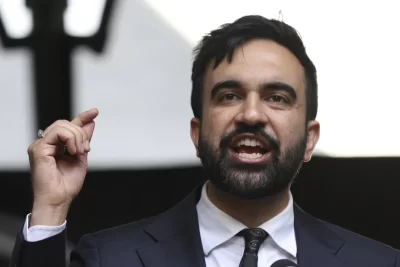
HOUSTON — The first change that stands out is the music, with President Joe Biden’s rock and Motown fading from the playlist in favor of more pop and hip hop.
Then comes Vice President Kamala Harris’ stump speech, devoid of Bidenesque rambling digressions and focused more on the future than a laundry list of past accomplishments.
In only a few days since taking over the campaign, Harris has put her distinctive stamp on the election operation. She’s raising excitement and drawing an outpouring of donations from Democrats who had feared they were sliding toward disaster with Biden at the top of the ticket.
Now, her challenge will be transforming that enthusiasm into a durable movement at hyperspeed. She still has to make hard choices about how to maximize her time on the trail, choose a running mate and develop a policy platform independent of Biden, while her opponents are eager to define her as unfit for the White House.
“This is the easiest week of the campaign for Harris,” warns Alex Conant, a Republican strategist. “It will not get better.”
Harris insists she’s ready.
On Thursday in Houston, she told Republicans to “bring it on” in “a fight for our most fundamental freedoms.”
As she hits the road, Harris’ most dependable applause line has been “we’re not going back.” She might be referring to Republican candidate Donald Trump, but it doubles as a pitch for the generational change that she’s offering.
Biden endorsed Harris as his successor with just 107 days left in the race, and Conant described her campaign as being “launched off an aircraft carrier.”
“It’s never been done before,” he said. “This is stuff that people usually spend years developing, and she’s doing it in days.”
Trump is revving up his attacks on Harris, calling her “bad news” and “a radical left, not very smart person” in an interview with Fox News on Thursday. Some Republicans have also suggested that Harris’ career has only advanced because of her identity; she’s the first woman, Black person and person of South Asian descent to serve as vice president.
Sen. Laphonza Butler, a California Democrat, says Harris is prepared for the extraordinary pressures of the campaign.
“She is clear eyed about the attacks that she is going to face,” Butler said. “But she’s also determined and confident in what leadership she can offer the Democratic Party and the American people.”
Democrats are happy with Harris’ early days, and they’re relieved that the transition from Biden has not devolved into painful infighting. Former President Barack Obama is preparing his own endorsement after being privately supportive of her candidacy, according to a person familiar with the matter who requested anonymity before an announcement.
“The party was ready to unite behind her,” said Anna Greenberg, a Democratic pollster. “If the opposite had happened, it would have been a complete disaster.”
Like Biden, Harris has struggled with low approval ratings. But her team argues that she’s well positioned to increase her support with young people, women and voters of color. If successful, she could compete more effectively in places like Georgia, Arizona and North Carolina, as opposed to just the “blue wall” states of Pennsylvania, Wisconsin and Michigan where Biden has been more focused.
There are dangers, too. Harris needs to avoid losing too much support among men, white people and older voters, which would erase her advantages with other parts of the electorate.
“People don’t know her that well,” said Celinda Lake, a Democratic pollster. “It’s a fight to define her.”
Republicans have a head start, at least when it comes to advertising. Trump and his allies are outspending Democrats by 25-to-1 on television and radio this week. However, Lake said Harris has one important thing going for her.
“Americans like the new shiny thing,” she said. “And Donald Trump is not new or shiny.”
Some Democrats are holding their breath, recalling how Harris’ campaign for the Democratic presidential nomination imploded four years ago before a single primary vote was cast. Her team was beset by infighting, and she failed to articulate a clear message in a crowded field of candidates.
More difficulty came after she became Biden’s running mate and took office alongside him. She struggled with staff turnover and muddled messaging.
Harris has to restore a sense of stability to a political operation that has been rocked by historic turbulence in the month since Biden’s shaky debate performance lit the fuse for his eventual decision to drop his reelection bid.
At campaign headquarters in Wilmington, Delaware, “Kamala” signs were swiftly printed and taped up on the walls next to “Biden Harris” ones.
Some of the campaign’s leadership — Jen O’Malley Dillon as chair and Julie Rodriguez as manager— are remaining in place. But Mike Donilon, a longtime Biden confidant, is stepping back from his original prominent role. It’s likely that Harris will expand the team with advisers of her own.
Harris visited Wilmington on Monday, the day after Biden announced he was dropping out. The staff cheered as she entered, and one woman appeared overcome with emotion, her eyes glistening.
“We’re on the right side of every single issue, and we have this team right here and thousands of others all around the country,” Harris told campaign workers who packed into a stuffy room to hear from their new candidate.
She spent the rest of the week tending to critical constituencies — battleground state voters near Milwaukee, Black women at a sorority conference in Indianapolis and union members at a teacher convention in Houston.
Sen. Tammy Baldwin, a Wisconsin Democrat, told reporters that Harris’ candidacy is “a new beginning for the party, a new beginning for the country.”
“This is really wonderful,” she added.
When Harris returned to Washington on Thursday afternoon, there were 103 days until the election.




